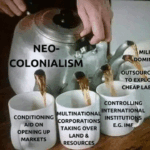by Jakob Drews
The global capitalist system is characterized by inequality through exploitation and dependency. These attributes were fostered by European colonization. Different parameters of dependency were institutionalized since the “independence” of the formally colonized. They characterize the structure of the international system. Some economies are profiting from the global capitalist system, some are doomed to depend on those who profit. This structure is binary and consists of the profiting centre and the exploited periphery. Both substructures were not “born” into their respective position. They were constructed. In this work, I am stressing the relationship between centre and periphery from a historical perspective. What constituted the centre in the centre and why is the periphery dependent on the centre?
Tag: World Bank
Glossary of the Institutionalized Regime of Underdevelopment
by Lisanna Kelz, Aikaterini Mouzaki, Zanê Aradine and Isabel Pearce
A Glossary narrating the Institutionalized Regime of Underdevelopment: A critical reflection of the market-oriented international order, reproducing neocolonial exploitation patterns. The glossary is divided into three sections: Institutions; Country Groupings, Unions and Organizations; and Terms of Economic and Financial Governance…
What do the Belgian Congo and Vietnam have in common? – Tracing Systems of Capitalistic Oppression Through History
by Michael Angulo, Grant Chamness, Sean Gordon and Salome Tash
We will begin by starting with a case study of colonialism in the Belgian Congo. Colonialism is the explicit act of controlling a populace and its resources using colonies with the purpose of economic and political exploitation…These capitalist exploitations will prove to reverberate through time, and will manifest themselves again through neocolonialism and neoliberalism. To demonstrate the timeless and adaptive nature of these motivations, we will present a case study in which colonialism evolves into neocolonialism. Specifically, we will dissect how French colonialism naturally transformed into the neocolonialist, American occupation of Vietnam and ultimately the Vietnam War…In the last portion, we will outline the ways in which the exploitative practices of colonialism are now institutionalized at the international level, and how state actors have given significant power to transnational corporations. This system of corporate control, and the laissez-faire nature of world markets, is what enables powerful neoliberalist countries to continue the legacy of exploitation established by colonialism and neocolonialism. The actions of the International Monetary Fund, and World Bank, are instrumental in the institutionalization of capitalist driven exploitation.


